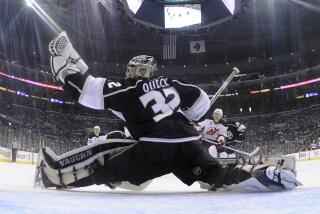Sockers’ Quinn Is Sweet on His Dual Role
- Share via
SAN DIEGO — It’s not as though Socker midfielder Brian Quinn has to make a career decision any time soon. At 30, he is considered one of the top soccer players in the country, yet this year he is making a transition toward a non-playing career.
Besides his role as Coach Ron Newman’s top playmaker on the field, Quinn is now Newman’s assistant coach off it.
But Quinn has been spending all of his time in the latter role. The midfielder has been slowed by a right groin strain that has kept him out of all four games this year. It will keep him out of the team’s home opener against the St. Louis Storm at 7:30 tonight at the Sports Arena.
Sitting is nothing new to Quinn. He had to do just that for parts of the past four seasons because of various injuries.
So with his body telling him it’s not getting any younger, Quinn has begun to adjust. He does not want to leave the game like a few of his former teammates who kept going into their mid-30s only to be forced out with little dignity.
“It happens to all soccer players,” Quinn said. “They realize that when they stop playing, they can’t go back, so we let someone else make the decision for us. I think we all feel we can play one more year--that we’ll be young forever.
“When my time comes, I hope to realize it right then, that there’s no back-biting or animosity between the parties. And the best way to do that is to go on to something else. I’d love to stay with the Sockers organization.”
Toward that end, Quinn already is gaining respect for his coaching ability through his playing skills.
“During the first few weeks of training camp, I just tried to stay with Brian Quinn everywhere on the field,” rookie David Banks recalled. “I wanted to watch what he does, even off the ball. He’s definitely one of the best players in the league. The things he does are unbelievable.”
Fellow rookie Eddie Henderson has also found himself spectating when Quinn is on the field.
“Just watching him play, you can learn so many little things that you wouldn’t even think of doing,” Henderson said. “Going to indoor (soccer from outdoor soccer) is a much more difficult transition than most people think. A lot of times you get stuck along the boards between two defenders. That happened to Brian one day and I thought, ‘OK, how’s he going to get out of this?’ Then he flipped the ball up about shoulder high, the two guys collided, he turned, chested it down and volleyed it into the net.”
Although Banks referred to him as “one of the best players in the league,” there are those, such as Newman, who find no need to qualify their statements. They say Quinn is the best.
But in the regular season, Quinn often goes unnoticed. He is the blue-collar guy, a proletariat who scurries around doing the dirty work and then dishes off so others can capitalize.
Thus his name is not among last year’s regular-season leaders in scoring, goals or assists.
But as much as he does behind the scenes in the regular season to orchestrate the Sockers’ attack, he often steps up his intensity and assumes a different identity in the playoffs.
A look at last year’s playoff statistics, and Quinn is everywhere. He topped the list of scoring leaders with 26 points, nine more than teammate Paul Wright’s second-place total of 17.
Quinn was also No. 1 in assists with 17, eight more than No. 2 Billy Ronson of Baltimore with nine.
His nine goals were the second-most in last year’s playoffs. Only teammate Waad Hirmez and Kansas City’s Dale Mitchell (each with 10) had more.
After his scoring explosion helped the Sockers to their eighth championship in nine years, Quinn was voted most valuable player, becoming only the second person to win that award twice. He also won it after the 1986 playoffs (in which the Sockers defeated the Minnesota Strikers in seven games). Steve Zungul is the other two-time recipient.
Because of his contributions to the team, President Ron Cady called Quinn into his office, patted him on the back and told him what a good job he did. Cady also said the team needed to cut his pay because the league reduced each team’s salary cap from $770,000 to $630,000.
How could the Sockers adequately compensate Quinn and not have the money count toward the salary cap? That’s when the assistant coach ploy was devised, but Quinn insisted that it be more than a ploy.
“I don’t want to take a coaching position just to be a figurehead,” he said at the time. “I would like to be involved.”
As the season enters its third weekend, Quinn still is searching for his niche.
“Ron has his way of doing things,” Quinn said when asked about his role, “and I have to find what I can do without interfering with what he does.”
Which could take some time. As Quinn pointed out, he’s pretty much a rookie at this coaching thing.
“You don’t go from being a player to being a coach in one day,” he said. “You don’t go to college one day and graduate.”
Quinn talks of his new role as though it is a small part of his duality with the club. But the young players tell a different story. When they have a question about tactics or strategy, they often go to Quinn, rather than Newman or Erich Geyer, another assistant coach.
“I often go up to him because we can speak more freely with Brian,” Banks said. “I feel I can trust him. He’s not going to shout you down--he gives you confidence.”
Added Henderson: “He keeps your confidence up, but he doesn’t build something that’s not there. If you do something wrong, he’ll say so, and as a rookie, you’re going to make a lot of mistakes. The other guys will look down at you and say, ‘Come on.’ But Quinny just says, ‘This is how you do it.’ ”
That the new players are more comfortable talking with Quinn is not necessarily a knock on Newman and Geyer.
“The younger players feel more confident talking to him than to Ron just because he’s still a player,” second-year forward Rod Castro said. “He understands players’ feelings and what’s going on in their minds.”
Castro said Quinn occasionally directs players through practices, a task of which Quinn at first was wary.
“It could have been difficult,” Quinn said, “but I feel a lot of the players have been really supportive of me. I ask them to do something and they do it.”
Said Castro: “For me, I have no problem with it because I respect (Quinn) as a player and as a person. If he can, he is always going to give 100%, so it’s easy to respect him. Of all the players, he was the perfect candidate for this position because he has always done whatever it takes to win.”
Socker Notes
The Sockers on Thursday filled their final two developmental spots by signing two local products, Martin Donnelly, Jr., who played at St. Augustine and Kearny High, and Joe Giacalone, who played at Mission Bay High. Both had been training with the Sockers since camp opened Sept. 10. . . . Donnelly is the son of former Socker Martin Donnelly, who played for the team from 1980-84. Martin Jr. is the first son of a former MSL player to enter the league. . . . Giacalone played collegiately with Socker midfielder Thien Nguyen at UC San Diego.
More to Read
Go beyond the scoreboard
Get the latest on L.A.'s teams in the daily Sports Report newsletter.
You may occasionally receive promotional content from the Los Angeles Times.






